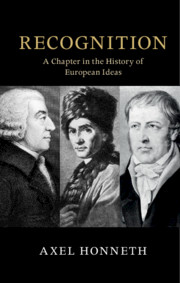2 - From Rousseau to Sartre
Recognition and Loss of Self
Published online by Cambridge University Press: 09 October 2020
Summary
This chapter shows that in French culture, starting with La Rochefoucauld and powerfully carried forward by Rousseau, the reliance upon the opinion of others (“recognition”) was considered to be a fundamental threat to a sort of virtuous self-reliance on individual conscience. The chapter seeks to demonstrate that this “negative” meaning of recognition is still present in subsequent figures, including twentieth-century authors such as Sartre. On the key issue of whether recognition is primarily a threat to authority or an opportunity for mutual affirmation, it is often insufficiently appreciated that Sartre was closer to Rousseau than to Hegel. The chapter also attempts to identify some sociopolitical reasons that may explain why such a negative understanding might have been dominant in French culture.
Keywords
- Type
- Chapter
- Information
- RecognitionA Chapter in the History of European Ideas, pp. 10 - 53Publisher: Cambridge University PressPrint publication year: 2020

